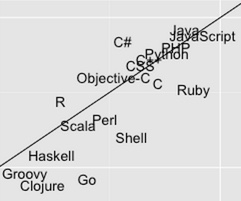 Every programmer knows that any time you want to start a religious war just ask everyone’s favorite programming language and why. This will almost certainly touch off an ever-more-heated exchange as to why one’s particular choice should be every thinking person’s obvious selection. It may even devolve so far as to include name calling. But hey, we’re all friends here so no need to be nasty about our favorite tools.
Every programmer knows that any time you want to start a religious war just ask everyone’s favorite programming language and why. This will almost certainly touch off an ever-more-heated exchange as to why one’s particular choice should be every thinking person’s obvious selection. It may even devolve so far as to include name calling. But hey, we’re all friends here so no need to be nasty about our favorite tools.
And why use opinion when we have actual usage data? In this case, the popularity of various languages on Stack Overflow, a popular programming discussion site, and GitHub, the now “go to” code repository. Thus we have the twin lens of what people say that they do and what they actually do.
The result isn’t really all that surprising overall. All the usual suspects appear at the top of the scattergram: Java, Javascript, PHP, Python, flavors of C, Ruby, etc. But I have to say that I’m gratified that Perl, my classic tool (I’m now also dabbling in Python) is still fairly popular.
Why CSS (Cascading Style Sheets) and XML are there is anyone’s guess, as the last time I checked they weren’t programming languages (XSLT justifiably appears). But whatever.
Check out your favorites and see where they fall on the curve.
Note: Thanks to Lorcan Dempsey for pointing this out.

